We may not have the course you’re looking for. If you enquire or give us a call on +41 315281584 and speak to our training experts, we may still be able to help with your training requirements.
We ensure quality, budget-alignment, and timely delivery by our expert instructors.
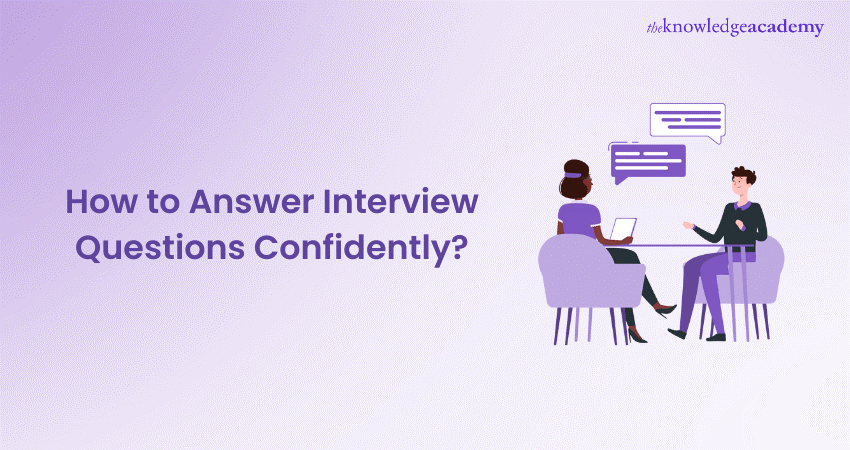
Walking into an interview and acing it with effortless charm is the ultimate dream for any job seeker. But that doesn't come easy; confidence is the ultimate ally in such situations. It’s not just about having the right answers—it’s about owning the moment, telling your story, and leaving a lasting impression.
This blog brings eight game-changing tips to help you wow your interviewers, stay calm under pressure, and turn the trickiest questions into your greatest strengths. So read on, learn How to Answer Interview Questions Confidently and land your dream job on the first attempt!
Table of Contents
1) Tips for Boosting Your Confidence Before an Interview
a) Mock Interviews
b) Know the Company and Role
c) Dress for the Part
d) Craft a Compelling Self-introduction
e) Develop Thoughtful Responses to Typical Interview Queries
f) Pay Attention to Non-verbal Cues and Body Language
g) Aim to Arrive Ahead of Schedule
h) Maintain a Positive Mindset Throughout
2) How Can I Present My Strengths Without Sounding Boastful During an Interview?
3) How Can I Avoid Rambling When Answering Interview Questions?
4) Conclusion
Tips for Boosting Your Confidence Before an Interview
Confidence is not something that you are born with or that you can fake. It is something that you can build and improve with practice and preparation. Here are some ways to boost your confidence before an interview:
1) Mock Interviews
Start with mock interviews, which you can conduct by finding a partner. Preferably, someone experienced with interviews will be the partner and can play the role of the interviewer and share feedback. You can also try these steps:
a) Prepare a list of common interview questions significant to your field.
b) Create an interview scenario by dressing up in a professional manner and behaving like you would in an interview. Practice sitting, standing, walking in, nodding, and even speaking. Keep a mirror in the room to assess your behaviour for better results.
c) Record this session and answer the questions like you would in an interview. Analyse this video and note what worked and where you could improve.
d) Using a stopwatch can help ensure you don't lose track of time and can answer concisely. Repeat this with multiple interviews until you get everything right.
2) Know the Company and Role
Confidence in an interview begins with preparation, and one way to achieve this is by understanding the company and the role you’re applying for. Try out the following steps:
a) Research the Company:
a) Understand the company's mission, values, and vision.
b) Explore its products, services, and recent achievements.
c) Familiarise yourself with its industry, competitors, and market position.
b) Study the Job Description:
a) Identify critical skills, qualifications, and responsibilities.
b) Prepare examples from your experience that showcase how you meet these requirements.
3) Dress for the Part
Dress code is a crucial factor while preparing for interviews. Going for clothes that make you feel professional can be a game changer. Here are some things to consider while deciding what to wear to an interview:
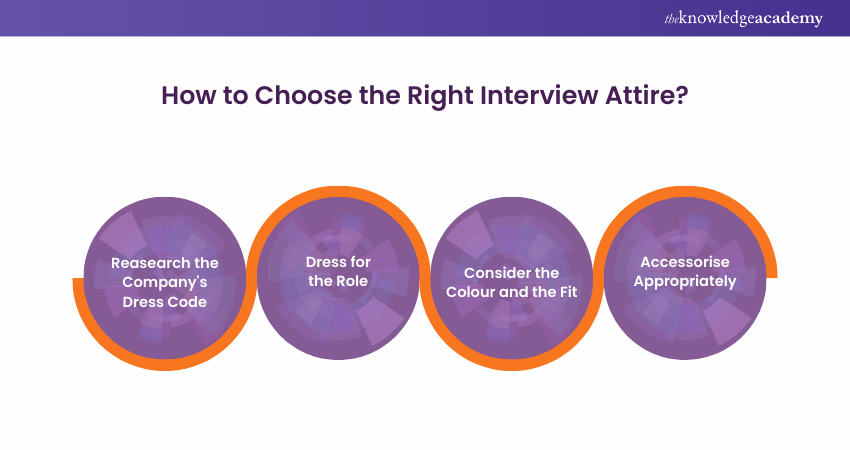
a) Clothes: Depending on your comfort zone, you can wear Western or traditional clothes. Men can wear suits or blazers with a well-fitted shirt and tie, and women can go for similar clothing or opt for a formal dress or skirt. You can also consider business casual attire, such as khakis, chinos, or dress pants paired with a button-up shirt. Another option is to wear traditional kurtas, salwar kameez, and sarees.
b) Colours: For your interview, choose neutral colours like navy blue, black, grey, or brown. Opting for minimal designs and solid colours is always better while dressing professionally. Avoid bright patterns, colours, and abstract prints. Some things to consider would be wearing well-ironed clothing, polished shoes, etc.
c) Minimalism: Wear minimal makeup and accessories, avoid applying gaudy makeup, or wearing heavy jewellery. Also, avoid flowy clothing and tassels as they can distract you during interviews. The goal is to keep your look simple and professional and your movements flexible.
d) Grooming: Small things can make a huge impact, especially in interviews. Consider details such as trimming your nails and having neatly combed hair. Women can opt for neatly tied hair, while men can appear presentable with a properly groomed beard or clean-shaven look.
Acquire the skills to spotlight achievements and contributions during an interview in our comprehensive Interview Skills Training - Sign up now!
4) Craft a Compelling Self-introduction
One of the most common interview questions is “Tell me about yourself”. This is your chance to make a good first impression and highlight your strengths and achievements. To craft a compelling self-introduction, follow these steps:
1) Start with your name and current position or role
2) Summarise your relevant education, skills, and experience
3) Mention your career goals and why you are interested in the job
4) End with a positive statement or a question to engage the Interviewer
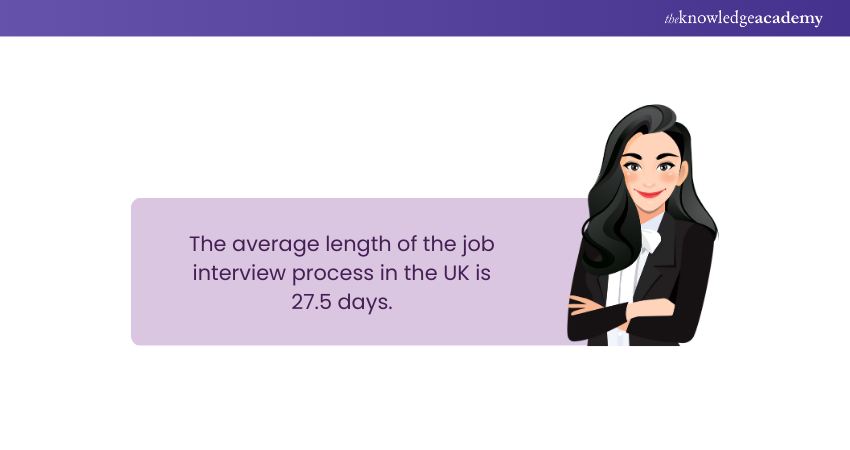
5) Develop Thoughtful Responses to Typical interview queries
Another way to boost your confidence before an interview is to anticipate and train for the questions that you are likely to face. Some of the typical interview queries are:
1) Why do you want to work for us?
2) What are your strengths and weaknesses?
3) How do you handle stress, pressure, or conflict?
4) How do you work in a team or independently?
5) What are some of the projects or achievements that you are most proud of?
6) How do you approach a new or challenging task?
7) How do you deal with criticism?
8) What are your salary expectations?
To develop thoughtful responses to these questions, follow these steps:
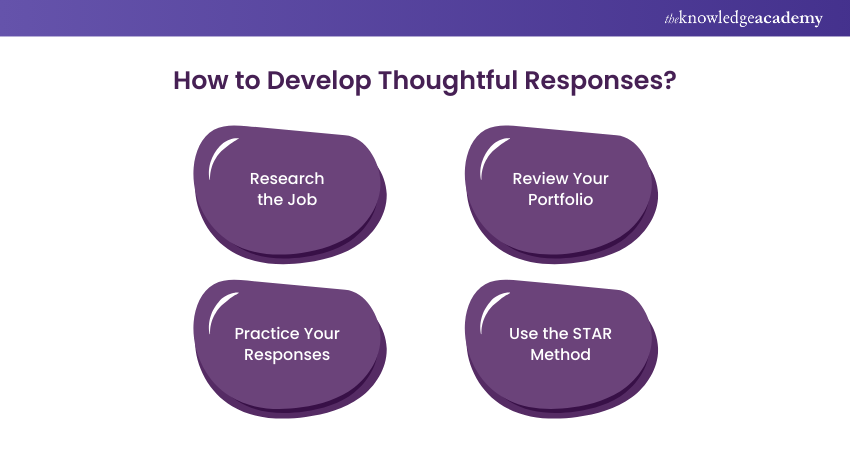
1) Research the Company, the Role, and the Industry: Find out what they are looking for, what their values and culture are, and what their challenges and opportunities are.
2) Review Your Resume and Portfolio: Identify your relevant accomplishments, experience and skills that match the job requirements and the company’s vision.
3) Use the STAR Method: STAR stands for Situation, Task, Action, and Result. It is a way to describe a specific example from your past experience that demonstrates your skills and abilities. For each question, think of a situation that you faced, the task that you had to complete, the action that you took, and the result that you achieved.
4) Practice Your Responses out Loud: Use clear and concise language, avoid filler words and jargon, and emphasise your positive outcomes and learnings.
6) Pay Attention to Non-verbal Cues and Body Language
Another aspect of confidently answering interview questions is to pay attention to your non-verbal cues and body language. These are the signals that you send to the Interviewer through your appearance, posture, gestures, eye contact, and facial expressions.
They can either enhance or undermine your verbal communication and your impression. To project professionalism and confidence through your non-verbal cues and body language, follow these tips:
1) Dress Appropriately for the Interview: Select an outfit that is clean, comfortable, and suitable for the company and the role. Avoid wearing anything that is too flashy, casual, or revealing.
2) Maintain a Good Posture: Sit or stand straight, with your shoulders back and your chest out. Avoid slouching, fidgeting, or crossing your arms or legs.
3) Use Positive Gestures: Use your hands to emphasise your points, nod your head to show agreement or understanding, and smile to show enthusiasm or appreciation. Avoid touching your face, hair, or jewellery or playing with your pen or phone.
4) Make Eye Contact: Look at the Interviewer when you are speaking or listening. This shows that you are interested, attentive, and confident. Avoid staring, blinking, or looking away too often.
5) Express Your Emotions: Use your facial expressions to convey your emotions and personality. Show that you are happy, excited, curious, or confident. Avoid showing that you are bored, nervous, angry, or scared.
Enhance your Emotional IQ and thrive with our Emotional Intelligence Training – Sign up now!
7) Aim to Arrive Ahead of Schedule
Another tip to boost your confidence before an interview is to aim to arrive ahead of schedule. This will help you to:
1) Avoid Being Late or Missing the Interview: Being late or missing the interview can ruin your chances of getting the job and can also make you feel stressed, anxious, and unprofessional.
2) Have Enough Time to Prepare and Relax: Arriving early can give you some time to review your notes, check your appearance, calm your nerves, and get familiar with the environment.
3) Make a Good Impression on the Interviewer: Arriving early to an interview can show that you are punctual, organised, and respectful. It also shows that you value the opportunity and the Interviewer’s time.
To arrive ahead of schedule, follow these tips:
1) Plan Your Route and Transportation: Check the traffic, weather, and public transportation conditions, and choose the best option to get to the interview location. Avoid taking any risks or shortcuts that might delay you or get you lost.
2) Pack Your Essentials: Prepare a bag or a folder that contains your resume, portfolio, references, notes, pen, paper, and any other documents or items that you might need for the Interview. Also, bring a bottle of water, a snack, a phone charger, and some cash or a card for emergencies.
3) Set an Alarm and a Backup Alarm: Make sure that you wake up early and have enough time to get ready and leave for the interview. Set an alarm and a backup alarm on your phone or another device, and test them before you go to sleep.
4) Leave Early and Arrive Early: Aim to leave your home or your current location at least an hour before the Interview time. Plus, aim to arrive at the interview site at least 15 minutes before the interview time. This will give you a buffer in case of any unexpected delays or problems.
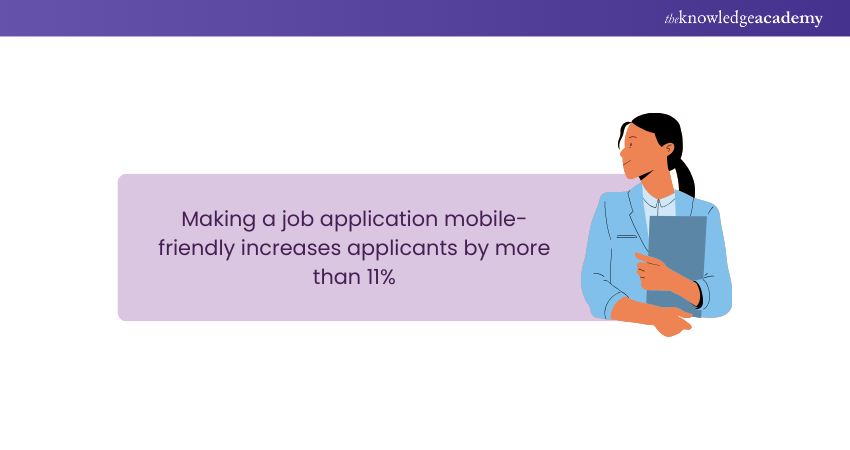
8) Maintain a Positive Mindset Throughout
The last tip to boost your confidence before an interview is to maintain a positive mindset throughout. Your mindset is the way that you think and feel about yourself, the interview, and the outcome. It can affect your mood, your behaviour, and your performance. To maintain a positive mindset throughout, follow these tips:
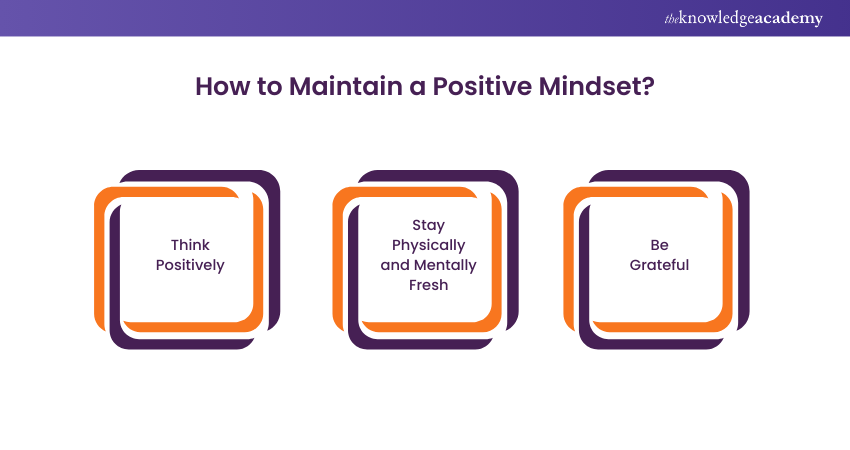
1) Think Positively: Focus on your strengths and achievements and remind yourself of past successes. Additionally, picture yourself acing the interview because Such visualisation can help reduce stress.
2) Stay Physically and Mentally Fresh: Ensure you get a good night's sleep before the interview. Go for a nutritious meal to keep your energy levels stable. Additionally, practice deep breathing or meditation to calm nerves.
3) Be Grateful: Appreciate the opportunity and the experience that the interview offers. Be grateful for this opportunity to learn, grow, and showcase your skills and personality. Express your gratitude and appreciation to the Interviewer and anyone else who helped you along the way.
Ignite your personal growth journey with our Personal Development Courses – Sign up today!
How Can I Present My Strengths Without Sounding Boastful During an Interview?
To present your strengths confidently, focus on sharing examples of how your skills have positively affected previous roles. The STAR method is a great way to showcase your strengths and show humility by spotlighting teamwork and collaboration.
How Can I Avoid Rambling When Answering Interview Questions?
To avoid rambling, focus on answering the question directly and succinctly. You can practice structuring your responses in an organised manner and try to keep answers to a few key points. It’s also helpful to pause and think before speaking to ensure you stay on track.
Conclusion
In conclusion, the answer to the all-important question How to Answer Interview Questions Confidently comes down to preparation, practice, and maintaining a positive mindset. You can effectively showcase your strengths by researching the company and role, properly organising your responses, and staying calm under pressure through breathing exercises. Remember, confidence doesn't come easy; it must be built over time. So, keep refining your approach, and you’ll excel in any interview.
Unlock your inner potential with confidence with our Confidence Building Training – Sign up now!
Frequently Asked Questions
What Should I Say if I Don't Know the Answer in an Interview?

In such a situation, you can respond with:
a) “I’m not fully familiar with that concept, but…”
b) “That’s an interesting question. So that I understand exactly what you are looking for, would you elaborate more on the question?”
c) “I’m so glad you asked about this. I want to learn more about it and am planning on…”
What Techniques can Help Calm My Nerves Before an Interview?

You can try out the following:
a) Do breathing exercises.
b) Visualise yourself succeeding in the interview.
c) Rehearse answers to common interview questions.
d) A light workout or quick walk can help release endorphins.
e) Spend a few minutes meditating.
f) Engage in a relaxing activity you enjoy before the interview.
What are the Other Resources and Offers Provided by The Knowledge Academy?

The Knowledge Academy takes global learning to new heights, offering over 3,000 online courses across 490+ locations in 190+ countries. This expansive reach ensures accessibility and convenience for learners worldwide.
Alongside our diverse Online Course Catalogue, encompassing 19 major categories, we go the extra mile by providing a plethora of free educational Online Resources like News updates, Blogs, videos, webinars, and interview questions. Tailoring learning experiences further, professionals can maximise value with customisable Course Bundles of TKA.
What is The Knowledge Pass, and How Does it Work?

The Knowledge Academy’s Knowledge Pass, a prepaid voucher, adds another layer of flexibility, allowing course bookings over a 12-month period. Join us on a journey where education knows no bounds.
What are the Related Courses and Blogs Provided by The Knowledge Academy?

The Knowledge Academy offers various Personal Development Courses, including the Time Management Training and the Interview Skills Training. These courses cater to different skill levels, providing comprehensive insights into What to Wear to an Interview.
Our Business Skills Blogs cover a range of topics related to interview skills, offering valuable resources, best practices, and industry insights. Whether you are a beginner or looking to advance your interview skills, The Knowledge Academy's diverse courses and informative blogs have got you covered.
Upcoming Business Skills Resources Batches & Dates
Date
 Confidence Building Training
Confidence Building Training
Fri 2nd May 2025
Fri 4th Jul 2025
Fri 5th Sep 2025
Fri 7th Nov 2025






 Top Rated Course
Top Rated Course



 If you wish to make any changes to your course, please
If you wish to make any changes to your course, please


